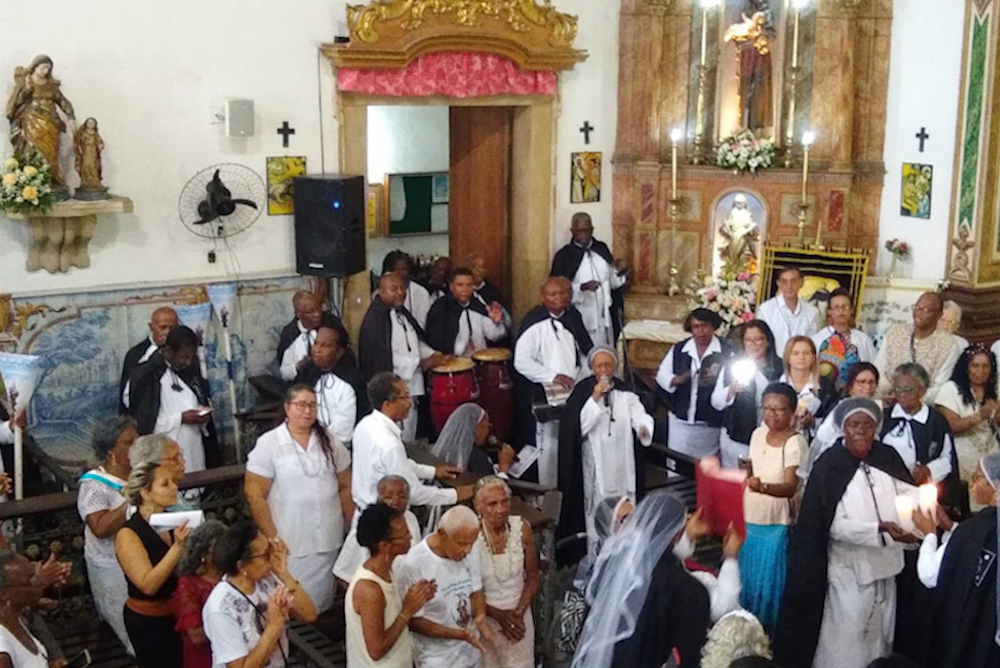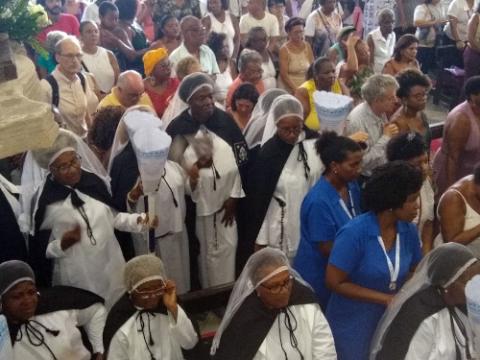
Members of black brotherhoods participate in a service at the Church of Our Lady of the Rosary of the Black Men in Salvador, Brazil. (Courtesy of William Justo)
At the end of October, members of Brazil's Catholic black lay associations gathered in the northern port city of Salvador to discuss their centuries-long history and the challenges facing the new network they have formed — an association of associations — in a country where the Catholic Church itself is questioning its future.
Created by slaves and emancipated black men and women in colonial times, when they were not allowed to attend the same churches as their white masters, the black lay associations were once refuges of solidarity and resistance against slavery. Most made efforts to buy freedom for their enslaved members. "Our brotherhood functioned as an important center in the abolitionist struggle," said Antônio Nicanor, a member of the Brotherhood of the Black Men in Salvador.
But the existence of the black Catholic groups is threatened by the same societal forces that are draining all established religions of members and energy, chiefly the loss of young people. "The average age in our brotherhood is 55," Nicanor told Religion News Service. "In most of the organizations all over Brazil, there's no effective renewal.
"Since 2017 we've been working to reunite all brotherhoods and communities in Brazil, in an effort to grow stronger," said Nicanor, referring to the network that is meant to bolster brotherhoods like his. "Our organizations are aging, and we have to fight against their end."
Some of the decline has to do with problems particular to Brazil's complex religious landscape. The lay associations have long been concerned with the conservation of African culture in the church, and many members are loyal both to Catholicism and to Afro-Brazilian religions such as Candomblé and Umbanda. These allegiances have caused some Catholic clergy to regard them with suspicion.
"We still suffer with the prejudice of some people in the church," said Analia Santana, a member of Nicanor's Brotherhood of the Black Men and an academic researcher specializing in its history.
"Many priests say they don't know anything about the black brotherhoods. Seminaries don't talk about us. What happens if a priest like this is suddenly appointed as our chaplain?" asked Vanilda Silvério, vice-director of the Brotherhood Our Lady of the Rosary of the Black Men, in São Paulo.

Members of black brotherhoods, which include both men and women, attend a service at the Church of Our Lady of the Rosary of the Black Men in Salvador, Brazil. (Courtesy of William Justo)
(In Portuguese, the term for these communities, " irmandade," encompasses both men and women, though it is often rendered as "brotherhood" in English, and many specify black men in their titles. Even so, women such as Silvério have only served in leadership roles since the early 2000s.)
Her association has existed in São Paulo since 1711 and counted more than 400 members a few decades ago. Now there are 62 brothers and sisters. "My grandfather joined the brotherhood in the 1920s. Now one of my daughters is also a member," said Silvério.
Her younger daughter, however, resists the idea of taking part in the group. "I'm 57. I'm worried about the future. I don't see many young people joining the brotherhood. They don't have time to contribute — they have to study and work."
Like many shrinking institutions, Brazil's lay Catholic associations both benefit from an infrastructure built up during their high times and pay dearly to maintain it. Most of the black fraternities own their churches, cemeteries and other historical buildings and are responsible for their conservation.
They also manage investment funds set aside for these properties' preservation, for association activities and to pay a few employees, but the members generally lack the financial expertise to do so, according to Fr. Lázaro Muniz, who was chaplain of the Brotherhood of the Black Men for seven years until early 2019.
During his tenure, Muniz created an archdiocesan commission in Salvador in order to keep up with the brotherhoods' activities.
"They're independent entities, but we struggled to help them reform their bylaws and make several changes for their own good. Several fraternities had to close due to management problems. Our struggle is to preserve them," he explained.
He was also one of the proponents of the national network of black Catholic lay associations founded three years ago.
"We hope very much this network will strengthen the brotherhoods. The meetings were very successful, and many of them are already in the process of reorganization," he said. He added that they are forging bonds with the Afro-Brazilian pastoral commissions in their dioceses that deal with black churchgoers.
Advertisement
Over 500 years, the lay associations have weathered changes in the church and the larger culture. Nicanor's Brotherhood of the Black Men, probably the oldest black brotherhood still active in Brazil, shows up in official records in 1685, but there's evidence it was created in 1604, according to Santana. Their staying power gives current members hope.
"Our brotherhood was always able to dialogue with the changing times and to renew itself. Many other entities had to close their doors throughout the centuries," Santana explained.
They also have the advantage of being deeply rooted in the lives of rural communities. Though many brotherhoods originated in Salvador, Brazil's first capital city and still its premier archdiocese, they soon spread across the country. They have long organized annual festivities in honor of their saints of devotion — black saints like Saint Benedict the Moor, Saint Elesbaan, Saint Ephigenia of Ethiopia and Saint Anthony of Carthage, who incorporated elements of the residents' original African cultures.
These highly ritualized festivities, known as congadas, included the coronation of a king and a queen of the brotherhood. Although many of the urban fraternities don't organize congadas anymore, they still can be seen in the countryside.
It is this kind of local religious culture that got favorable attention at the recent Synod for the Pan-Amazon Region, where Pope Francis urged bishops to reflect on "enculturation," as the church calls adaptation of Christianity to local contexts. Muniz believes this kind of thinking may be helpful in renovation of the Brazilian brotherhoods.
"This moment invites the fraternities to search for news ways, assuming a path of evangelization and offering possibilities for the youth to assume their traditions."
For Nicanor, the black lay associations still have a contribution to make for a church that, guided by Francis, is looking for more lay involvement.
"The church needs to feel that it's the lay people who make Catholicism and not the clergy," he said.







